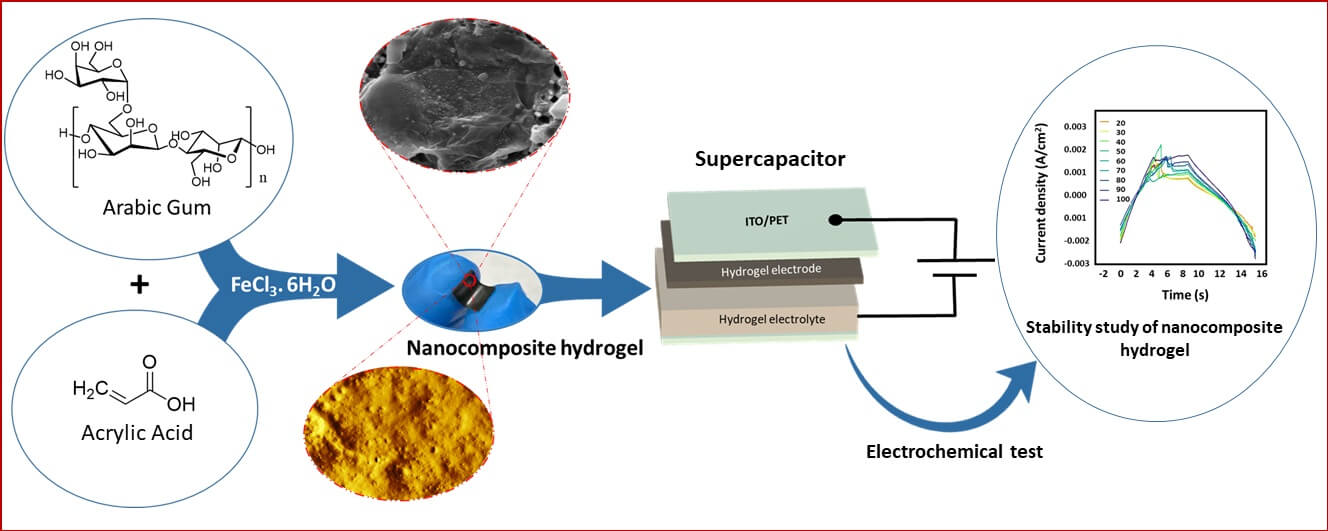 Open Access
Open Access
ARTICLE
Advanced Nanocomposite Arabic Gum Polyacrylic Acid Hydrogels for Flexible Supercapacitors
Nanotechnology Institute, Jordan University of Science and Technology, P.O. Box 3030, Irbid, 22110, Jordan
* Corresponding Author: Borhan Albiss. Email:
Journal of Renewable Materials 2024, 12(7), 1219-1236. https://doi.org/10.32604/jrm.2024.050685
Received 13 February 2024; Accepted 27 May 2024; Issue published 21 August 2024
Abstract
In this work, the fabrication and characterization of the nanocomposite hydrogel, as a solid electrode in electrochemical cell and gel electrolyte material using Indium titanium oxide/polyethylene terephthalate (ITO/PET) flexible substrate for double-layer supercapacitors have been reported. The nanocomposite hydrogel composed of Arabic gum (AG), Acrylic acid (AA), reduced graphene oxide (RGO), and silver nanoparticles (AgNPs) was fabricated via a physical cross-linked polymerization reaction, in which the ascorbic acid was used as a reducing agent to generate AgNPs and to convert Graphene oxide (GO) to RGO during the polymerization reaction. The morphology and structural characteristics of nanocomposite hydrogel were investigated using atomic force microscopy (AFM), scanning electron microscope (SEM), Fourier transfer infrared (FTIR), and X-ray fluorescence (XRF). Additionally, the effect of RGO and AgNPs on hydrogel stability was assessed through Thermogravimetric analysis (TGA) and differential scanning calorimetry (DSC), while its mechanical properties were studied using the nanoindentation test. Electrochemical impedance spectroscopy (EIS), and cyclic voltammetry (CV) were also conducted to study the electrochemical properties of the prepared hydrogel. The effects of AgNPs, RGO, and water content were all considered in the study of supercapacitor performance. The microstructural tests showed that the nanocomposite hydrogel has a relatively high swelling rate, which has a crucial effect on the capacitance. Furthermore, the effects of increasing AgNP concentration and water content in the hydrogel matrix showed a significant improvement in its electrochemical performance, compared with that for Arabic gum poly acrylic acid (AGPAA) hydrogel itself, were the specific capacitance exhibited a significant enhancement, converting from a low value to a substantially higher capacitance value. Moreover, when the nanocomposite hydrogel was used as the working electrode in an electrochemical cell with a hydrochloric acid (HCl) electrolyte solution, it exhibited good electrode performance. Additionally, using (ITO/PET) as a flexible substrate for nanocomposite hydrogel shows an improvement in their suitability for supercapacitor applications. Therefore, it is suggested that the fabricated hydrogel supercapacitor has potential applications in the field of renewable and clean energy harvesting.Graphic Abstract

Keywords
Supplementary Material
Supplementary Material FileCite This Article
 Copyright © 2024 The Author(s). Published by Tech Science Press.
Copyright © 2024 The Author(s). Published by Tech Science Press.This work is licensed under a Creative Commons Attribution 4.0 International License , which permits unrestricted use, distribution, and reproduction in any medium, provided the original work is properly cited.


 Submit a Paper
Submit a Paper Propose a Special lssue
Propose a Special lssue View Full Text
View Full Text Download PDF
Download PDF Downloads
Downloads
 Citation Tools
Citation Tools